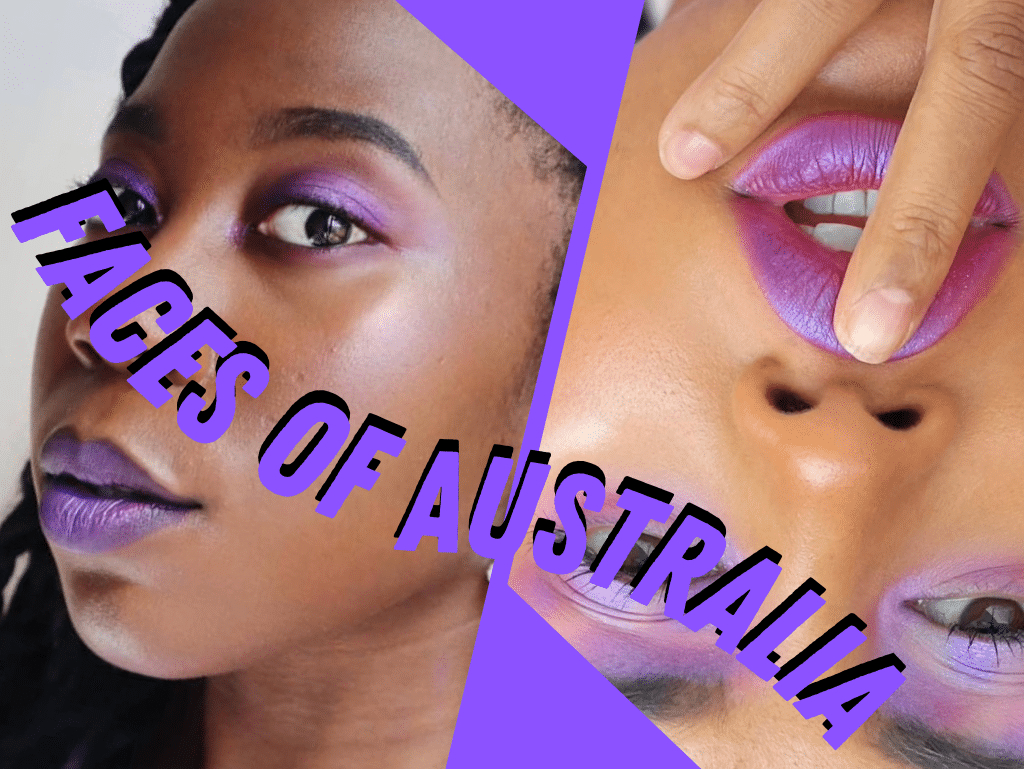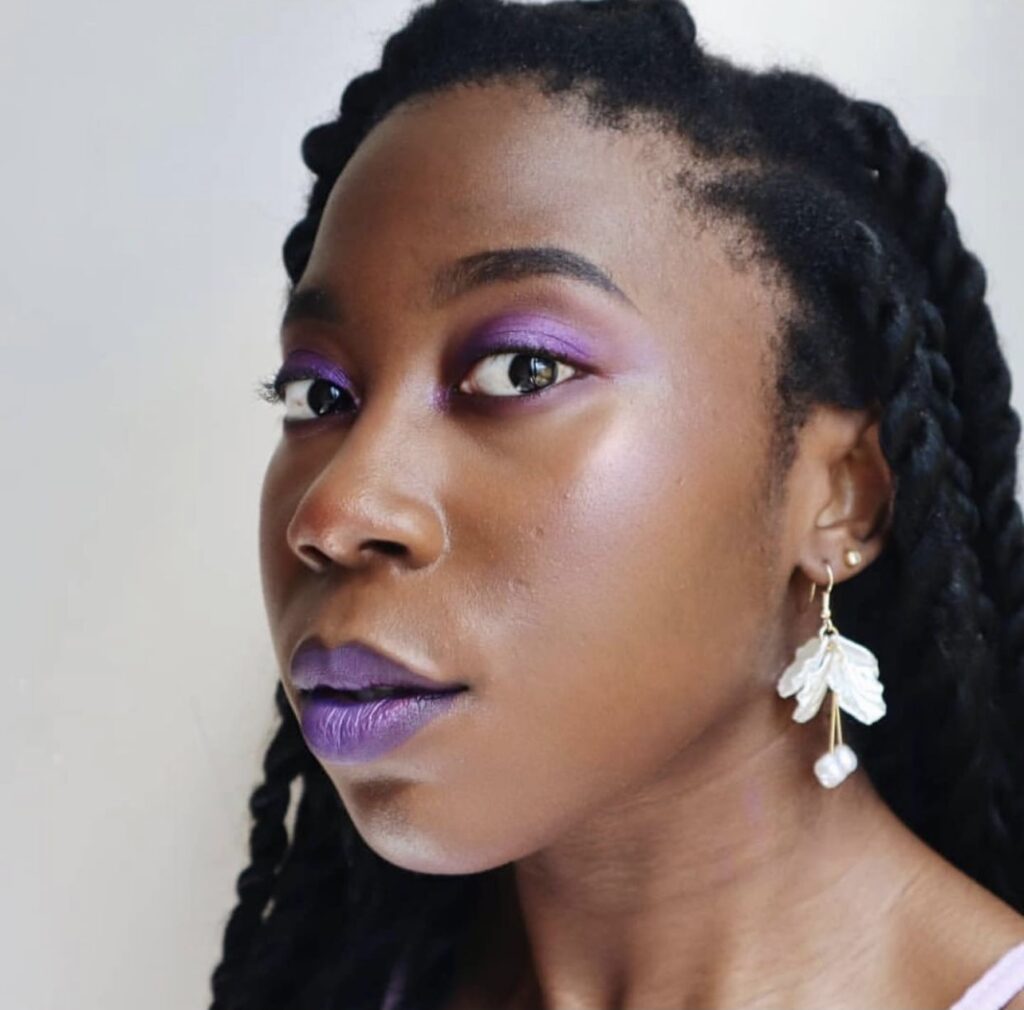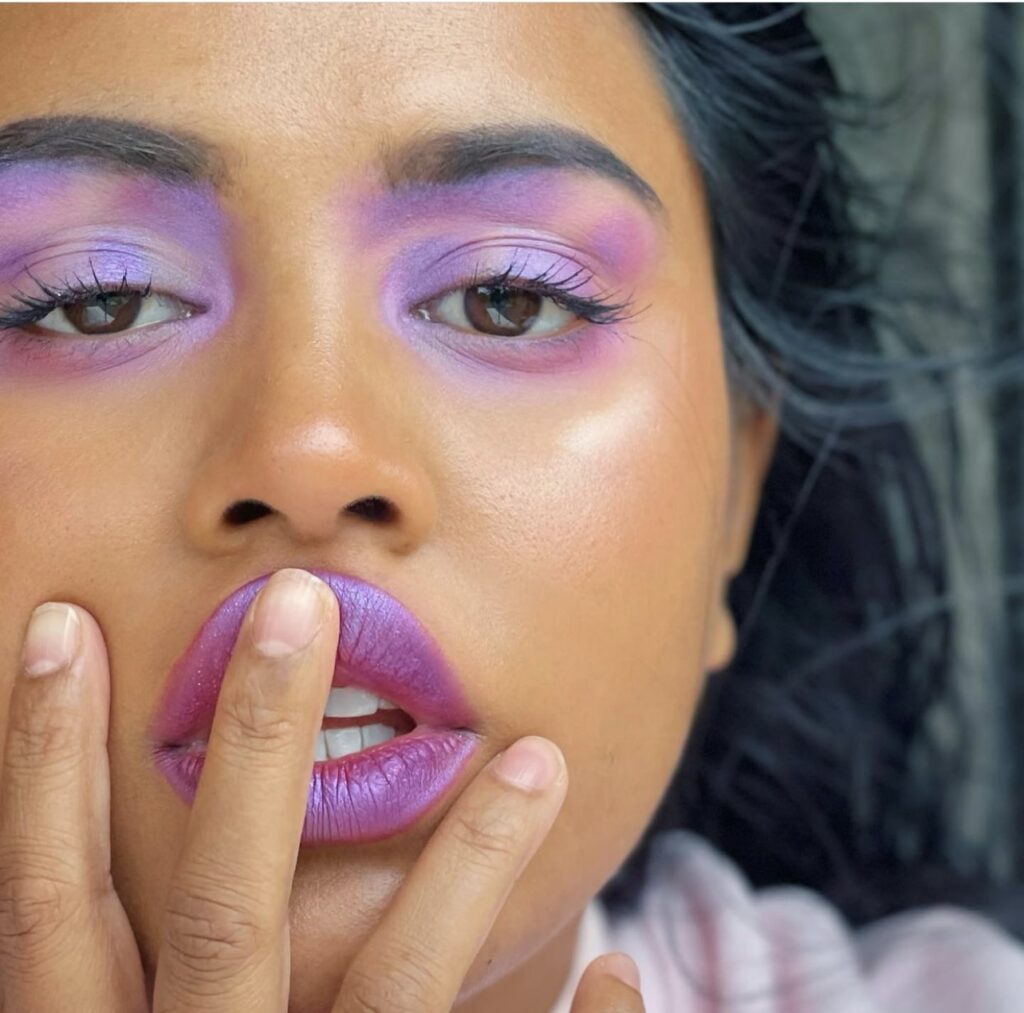
Faces of Australia is a column highlighting BIPOC creatives to bring you their stories. Creators are asked to collaborate on a makeup look that empowers, holds meaning, or describes their experience as it relates to Australian beauty standards and the Australian beauty industry. Faces of Australia is written and produced by Ruchi Page, with a mission to show the beauty industry how accessible BIPOC talent is across this diverse nation.
Episode 7: Nkisu
The brief? Purple worn two ways. Welcoming 24-year-old product photographer and content creator, Nkisu, to Faces of Australia.
Born in Zambia and now residing in Perth, Nkisu and her family settled in Australia 14 years ago. Whilst taking outrageously brilliant shots of skincare and baked goods (stunning combo for an IG feed, btw), the multifaceted creator currently studies midwifery full-time in between learning Spanish, cultivating her culinary skills, and soaking up reading on her Kindle.
Nkisu and I both share an obsession with skincare and the colour purple— two factors that influenced our makeup look. But makeup was not always on Nkisu’s radar and I was curious as to why. She tells me it was simply based on her belief that deeper skin tones didn’t wear makeup. It was at this moment that I knew we had a whole conversation to unpack.

I wanted to unfold the Perth blogger’s experiences as a woman of colour from a child until now. Nkisu began her schooling journey in Zambia, where feelings of connection and understanding were the main theme. Eventually, life brought Nkisu and her family to Australia. It would be this chapter where Nkisu found herself isolated, with quite literally zero social interaction with other POC at school.
“When I moved to my second school in Australia, it was the first time I was mature enough to really feel and understand how ‘othered’ I was,” she tells me.
This was a sentiment I personally understood too well. Being the only POC in a school environment can often attract uncomfortable conversations and experiences. And whilst Nkisu notes she did not experience what she considers to be “blatant racism,” she frequently found herself “still having to deal with microaggressions as well as ignorant comments that were never of concern to non-black friends.”
We both agreed that this shared experience can result in feelings of loneliness and the requirement to build a thick skin. For many young BIPOC, this also comes with the need to accept that battling racist microaggressions and ignorance can be a solo fight as our peers struggle to understand the frustration and hurt.
From late teens to early adulthood, the skincare enthusiast gained an intrigue for the beauty world— a place of creative freedom and comfort for Nkisu. Creating a flawless base became a challenge when Nkisu soon realised complexion products were unavailable and/or ‘unmarketable’ for deeper skin tones.
“For years growing up I just assumed that Black people didn’t wear foundation because I had never seen foundation or complexion products run in a shade darker than beige and medium,” she says.
Thanks to online platforms like YouTube and Instagram, Nkisu was introduced to base products for deeper skin tones. But to her disappointment, these products were almost completely absent from Australian shops. Accessibility to these deeper shades became a hunt for gold. “I remember when my Year 12 ball was rolling around, I had to take a chance and just order the darkest foundation I could find on eBay because there were zero retailers or beauty counters I could go to in-person to get colour matched.”

Nkisu and I both agreed that this exclusion is purposeful. The assumptions made by the Australian beauty industry about who will and who won’t invest in product (or possibly more accurately, who is worth representation and who isn’t) is painful for young makeup lovers of all skin tones, races, and ethnicities.
Nkisu highlights, “It’s only really been the last five years that finding affordable makeup has become marginally better. There has definitely been improvement, but I’m just disappointed we’ve had to wait so long.” We agreed that this conversation holds significant value, but are very much aware that our hopes for equity in the beauty industry are still a pipe dream at this stage.
Unfortunately, Australia’s continued lack of representation, inclusion, and diversity in the beauty industry makes it evident that equal access to product is not a priority for many brands. I asked Nkisu how this makes her feel. “To me it says, I don’t matter,” Nkisu answers. “It must be nice knowing that the beauty industry caters for your needs. Many caucasian people can easily go to the pharmacy or beauty retailer and be guaranteed to find a selection of makeup to use. Some of us don’t have that luxury.”
While makeup may seem surface-level, this issue is so much more than skin deep. When we exclude entire groups of people based on their skin tone, this perpetuates Asutralia’ss racist history in the present day. Nkisu reiterates that the lack of diversity in the Australian beauty industry screams that the BIPOC community “does not have a seat at the table. And how is that fair?”
Vibrant and powerful just like our bold look for this episode, I leave you with Nkisu’s advice for the Australian beauty industry:
“Diversify your workspaces and the creatives you work with. Performative allyship is simply draining and not helping anyone. If you are going to post a black square saying ‘Black Lives Matter’ and not implement any thorough plans towards affording BIPOC creatives the same opportunities as caucasian people, you might as well have remained silent. This land belongs to Indigenous Australians and yet how often do you see them represented in beauty campaigns? Listen to the constructive criticism and feedback BIPOC have because beauty doesn’t belong to one group of people. Silencing our voices does not only conduct a disservice to us, but your brand as well.”
– Nkisu, content creator and student
PRODUCTS USED







